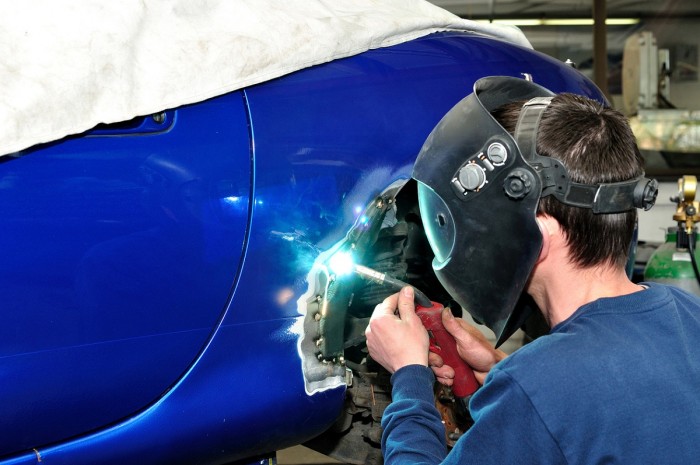Coachbuilder/Trimmer
Kaihanga Pahi/Kaiwhakarākei Waka
Alternative titles for this job
Coachbuilders manufacture and assemble frames, panels and parts for vehicles such as buses and motor homes. Vehicle trimmers install and repair the upholstery of vehicles.
Pay
New coachbuilders/trimmers usually earn
$24 per hour
Experienced coachbuilders/trimmers usually earn
$24-$26 per hour
Source: Careers Directorate – Tertiary Education Commission research, 2017
Job opportunities
Pay
Pay for coachbuilders/trimmers varies depending on skills, experience, employer and the type of work they do.
- Coachbuilders/trimmers in training usually start on minimum wage.
- Qualified coachbuilders with at least three years' experience can earn between minimum wage and $26 an hour.
- Very experienced coachbuilders/trimmers may earn more than $26 an hour.
Those running their own business may earn more than this, but their income depends on the success of the business.
Source: Careers Directorate – Tertiary Education Commission research, 2017.
- PAYE.net.nz website – use this calculator to convert pay and salary information
- Employment New Zealand website – information about minimum wage rates
(This information is a guide only. Find out more about the sources of our pay information)
What you will do
Coachbuilders/trimmers may do some or all of the following:
- cut, shape, glaze and spray-paint metal parts
- build vehicle frames
- assemble and join parts to the frame, such as floor, roof and side panels
- install electrical wiring
- fit additional parts to vehicle bodies, such as hydraulic lifts and refrigeration equipment
- repair, replace and modify frames and parts
- install or repair upholstery.
Coachbuilders/trimmers working on motorhomes may also install plumbing, pressure-water systems, waste-water systems and gas in the vehicle.
Skills and knowledge
Coachbuilders need to have:
- knowledge of vehicle building materials and equipment
- welding and collision repair skills, including the ability to cut and shape metal
- skill in interpreting plans and sketches
- knowledge of NZ Transport Agency regulations
- knowledge of safe working practices.
Vehicle trimmers need to have:
- sewing and pattern making skills
- knowledge of different fabrics used in upholstery work.
Working conditions
Coachbuilders/trimmers:
- usually work regular business hours, but may work overtime at busy times
- work in factories or workshops.
Entry requirements
There are no specific entry requirements to become a coachbuilder or trimmer.
Qualifications for coachbuilding and vehicle trimming
To become a qualified coachbuilder you need to complete an apprenticeship and gain a New Zealand Certificate in Coachbuilding (Level 3), overseen by industry training organisation MITO.
To become a qualified vehicle trimmer you need to complete an apprenticeship to gain a New Zealand Certificate in Industrial Textile Fabrication (Level 3).
- MITO website - information about apprenticeships and training
- More information about apprenticeships
Other trades useful background for coachbuilders and trimmers
Employers also hire people with other relevant experience or qualifications.
For coachbuilders, experience in mechanical engineering, fabricating or welding is useful.
For trimmers, experience in sewing or upholstery is useful.
Secondary education
No specific secondary education is required for this job. However, English, maths, construction and mechanical technologies, and processing technologies to at least NCEA Level 2 are useful.
Personal requirements
Coachbuilders/trimmers need to be:
- efficient and practical
- accurate, with an eye for detail.
Useful experience
Useful experience for coachbuilders/trimmers includes:
- fabrication work such as welding and working with sheet metal
- assembling vehicles
- work as a panelbeater.
Upholstering or sewing experience is useful for those wanting to work as a vehicle trimmer.
Find out more about training
- MITO
- 0800 882121 - www.mito.org.nz
What are the chances of getting a job?
Coachbuilders/trimmers in demand
Chances of getting a job as a coachbuilder or trimmer are good due to high demand for:
- buses to cater for growth in public transport and tourism
- motorhomes for growing numbers of tourists
- trucks to transport increasing amounts of road freight.
They are also needed to maintain and rebuild existing vehicles.
There is a shortage of coachbuilders/trimmers due to:
- increased competition for their services in similar types of work
- not enough people entering training.
However, vacancies are limited as coachbuilder/trimmer is a small occupation.
According to the Census, 732 coachbuilder/trimmers worked in New Zealand in 2018.
Coachbuilders/trimmers work in main centres
Approximately a third of coachbuilders/trimmers are employed in Auckland and most others work in Hamilton, Christchurch, Tauranga and Wellington.
Types of employers varied
Coachbuilders/trimmers work for companies that:
- manufacture and service buses, motorhomes, caravans or heavy trucks
- run public or tourist buses
- upholster vehicles
Self-employment higher for trimmers than coachbuilders
Thirty five percent of trimmers are self-employed, but only five percent of coachbuilders.
Sources
- Ministry of Business, Innovation and Employment, ‘2006-2014 Occupation Data’ (prepared for Careers New Zealand), 2015.
- MITO, 'Automotive Workforce Development Strategy, 2016', October 2017.
- Pritchard, N, Collision Repair Association New Zealand, Tertiary Education Commission - Careers Directorate interview, October 2017.
- Stats NZ, '2018 Census Data', 2019.
(This information is a guide only. Find out more about the sources of our job opportunities information)
Progression and specialisations
Coachbuilders/trimmers may progress to set up their own coachbuilding or trimming business, or move into management roles. Trimmers may progress into interior vehicle design.
Coachbuilders/trimmers may specialise in buses, vans, trucks, caravans or motorhomes, or super yachts.
Last updated 27 March 2025


